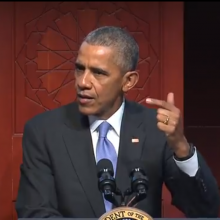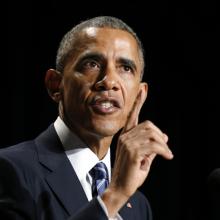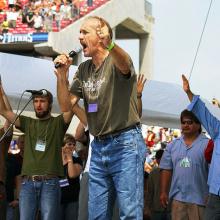extremism
BEFORE 2020, REV. JOSH GELATT did not know much about QAnon. Gelatt had been lead pastor at Cascades Baptist Church in Jackson, Mich., since 2016. On occasion, he had heard congregants allege that “Democrats, liberals, and socialists are evil,” and that “they’re out to close churches and take away guns in the United States.” He had heard Christian nationalistic claims, such as “we are God’s chosen country.”
Gelatt, who does not identify as a Democrat or a Republican, was reasonably concerned. Then in spring 2020, Gelatt noticed what he called an “alarming twist” in his congregation.
After the murder of George Floyd in May, Cascades Baptist Church erupted with QAnon’s apocalyptic conspiracy theories, which the FBI has warned may lead some adherents to domestic terrorism. In the church and on social media, Gelatt witnessed members share false allegations that then-presidential candidate Joe Biden had “an island with an underground submarine where he receives his pedophile orders” and that there were “underground railroads between various cities run by Hollywood elites.” Congregants claimed that then-President Donald Trump was going to “seize power, execute the liberals, and expose pedophile rings.”
Politics has always involved disagreements, but it’s not the same as it ever was in today’s United States. Something has changed. In a national survey we at More in Common conducted last month, fully 87 percent of Americans said that they feel the country is more divided than at any point in their lifetimes.
But outsiders, especially conservative Christian neighbors, considered the Rajneeshees a threat. In Wild Wild Country, we see Osho speak to his followers of “an awakened man,” and meditation as a means of attaining higher levels of awareness. His seemingly revolutionary way to sainthood, which rested on being spiritual without having to isolate or reject human needs, had a profound effect on his devotees, and soon his stature grew to resemble that of a rockstar. Neighbors around Rajneeshpuram felt they were being too quickly outnumbered. And they were — they lost elections, as well as the city council.
We live in a world full of extremists. It is not just in American society that the battle between extreme beliefs on either end of the spectrum is happening constantly in our political, social, and religious circles. Violence, hate crimes, and acts of oppression erupt all over the world, and through the news and social media, we are witnesses to the distress calls of the people who are caught in the middle of these battles
Every time more civilians are killed, it gives further weight to the idea that we have lowered value of human life — or at least, the value placed on Iraqi lives. Imagine the response, by comparison, if 200 American aid workers were killed in an errant strike. The seemingly low threshold for civilian safety makes the fight against ISIS harder, not easier. It makes ISIS propaganda more believable. At the very moment when ISIS should be gasping its final breath, these incidents inject life into their militancy.
Cherian George: "One of the bitter ironies is that the extreme right the world around, although they may detest each other, are remarkably similar in the way they operate and in their world views. They believe in a certain purity of identity. They often use similar tactics."

Image via REUTERS / Adrees Latif / RNS
Tragedies like the June 12 Orlando shooting seem to happen like clockwork, with the U.S. now averaging one mass shooting every day. And in cases where the shooter has a Muslim-sounding name, terms like “terrorist,” “extremist,” “radical,” joined with “Islam” quickly appear.
President Obama took a swipe at the use of such terms earlier this week. In response to Donald Trump’s accusation that he has an ulterior motive in avoiding the term “radical Islam,” the president said the term was “a political distraction.”
IN DECEMBER 2007, Naomi Mwangi, a Christian, fled her home in Kisumu, Kenya, as men with machetes attacked towns across the region. For five weeks violence raged nationwide. When the bloodshed ended, more than 1,300 Kenyans were dead and another 650,000 had been displaced. Mwangi and her family ended up living in the Maai Mahiu refugee camp, south of Nairobi. She was 12 years old.
Mwangi is coming of age in a society with ethnic violence in the background, extremist violence in the foreground, and massive economic inequality. Africa has the highest concentration of young people in the world and more than half of them are unemployed. Mwangi wanted something different—she wanted to work for peace.
Now 21, Mwangi is a leader in grassroots peacemaking campaigns that seek to end conflicts between the 42 ethnic groups in this majority-Christian country. The 2007 election violence pitted Christian against Christian, as ethnic ties trumped religious affiliation. Even now, during elections, Mwangi told Sojourners, “Leaders motivate youth to join in the political crisis ... to fight against another tribe.”
A major obstacle to social and economic stability among youth in Kenya is unequal distribution of government-issued identification cards. Kenyans need ID cards for everything from voting and university enrollment to obtaining grants for entrepreneurship programs. But historically, the ruling government doled them out as political favors, and they’ve often been denied to members of minority groups.
“There are plenty of applications at election time,” Mwangi said, explaining that the ID process is slowed down or delayed when it seems one ethnic group could tip the chances of a politician who represents a different group.

Screenshot via the White House
In times of rising Islamophobia, President Obama made a plea for religious tolerance at the first visit to an American mosque of his presidency. A lot of Americans have never been to a mosque, the president said as he began his speech, shoeless per Muslim tradition, in the Islamic Center of Baltimore’s prayer hall on Jan. 3.

Cadets who presented West Point's project. Image via Lauren Markoe/RNS
Last fall, 16 West Point cadets — none of them Muslim — signed up for an elective on counter-terrorism and created a Facebook page to appeal to young Muslims thinking about joining the so-called Islamic State group. The cadets aimed to convince those tempted by the terrorist cause to see jihad in Islam as a peaceful endeavor. For their project to succeed, the cadets knew, they would have to learn more about the faith, and build a social media platform that reserved judgment even on those who expressed admiration for committed terrorists.

Rabbi Jonathan Sacks. Image via Blake-Ezra Photography / RNS
Religious zealots fill newspapers and screens with bloody images of bombings and beheadings. They kidnap children and make them into soldiers. They pray before they rape women.
But “not in God’s name,” says Rabbi Lord Jonathan Sacks, the former chief rabbi of Great Britain, who just published a book by that title.
“The greatest threat to freedom in the post-modern world is radical, politicized religion,” Sacks writes. Religion News Service asked Sacks how people can kill in the name of God, and how religion can counter religious extremists.
Teens across the world are still flocking to monks in France to deepen their Christian faith? Yes — and my family and I remained in awe of its tent-dotted fields and large scale kitchens staffed all by volunteers.
The Taize community of brothers from across Christian traditions — alongside sisters from a Catholic order — host religious thinkers, leaders, practitioners, and especially youth who want to engage biblically around issues spanning peace, justice, the arts, service, and Christian practice. We came to Taize as a spiritual "vacation-pilgrimage" during their 75th anniversary celebration and the 10th anniversary of Taize's founder’s death, joining religious leaders from around the world.
For American Christians who may be stuck in habits of religious thinking that promote "all or nothing," "left and right" interpretations of the Scriptures, Taize invites us to sing together and investigate the scriptures from a fresh global perspective.
After taking heat from the religious right for saying Christians and Muslims have all committed horrors in God’s name, President Obama is now angering the religious left with an upcoming White House conference on combating ”violent extremism” that seems to focus only on Muslims.
The back-to-back controversies raise the question: Can Obama — or any president — safely discuss faith in today’s political crosswinds?
No, say experts who keep a close eye on presidential God talk. It’s a perilous walk, taken without a safety net as news and social media voices wait to savage him in a nanosecond.
Obama’s remarks at the National Prayer Breakfast triggered fury when Obama mentioned the Crusades, the Inquisition and Jim Crow segregation laws as examples of Christian violence in God’s name.
“This is not unique to one group or one religion,” Obama said. “There is a tendency in us, a sinful tendency that can pervert and distort our faith.”
Muslims in America are much less inclined to support suicide bombing than other Muslims abroad, and are more likely to believe that people of other faiths can attain eternal life in heaven, according to a new report released Tuesday by the Pew Forum on Religion & Public Life.
“The World’s Muslims” report looks at Muslim views across seven categories: Islamic law; religion and politics; morality; women; relations among Muslims; interfaith relations; and religion, science, and pop culture. There is also a special section on U.S. Muslims.
Of the countries surveyed, only a majority of Muslims in America — 56 percent — believe people of other faiths can go to heaven; by contrast, that figure among U.S. Christians is about 64 percent. U.S. Muslims are also less likely than Muslims abroad to believe in evolution, sharing views that are closer to those of U.S. Christians.
On suicide bombing, 81 percent of U.S. Muslims said it was never justified, 7 percent said it was justified to “defend Islam,” and 1 percent said it was “sometimes justified.”
American Muslim leaders said they stand against terrorism committed in the name of Islam, trying to distance themselves from the suspects in the Boston Marathon bombings who were identified as Muslims with ties to Chechnya.
“We will never allow ourselves to be hijacked by this attempt, and we will not allow the perception to be that there is any religion in the world that condones the taking of innocent life,” said Nihad Awad, national executive director of the Council on American-Islamic Relations.
As the manhunt intensified in and around Boston, Muslim leaders convened a press conference Friday to denounce the attacks and to urge the media not to link their faith with violent extremism.
President Obama on Tuesday gave a forceful speech at the United Nations, in which he challenged much of the world's assumptions about free speech and religion.
Here are five points from his address, which together, add up to as close to an Obama Doctrine on Religion as we've seen:
1. Blasphemy must be tolerated, however intolerable
The idea that the U.S. protects even vile speech, so ingrained in American culture, seems counterintuitive to much of the world. It’s an especially tough concept when speech targets a religion, but Obama argued that restrictions on speech too often become weapons to suppress religion – especially the rights of religious minorities.
Initial results from Egypt’s first round of elections produced an unexpectedly large showing for Islamists. The Freedom and Justice Party of the Muslim Brotherhood gained approximately 37 percent of the seats selected from political party lists, in line with predictions. The real shocker was the 24 percent vote obtained by the al-Nur party of the Salafi movement. The Salafis are extreme conservatives who favor restrictions on the role of women and Saudi-style controls on public morality. Liberal-left parties in the various party blocs gained about 37 percent. The results are very preliminary, with two more rounds of voting still ahead.
Though I treasure my Pentecostal heritage, these days I feel like an outsider looking in, because though it started out as a pacifist movement in the early 20th century, today Pentecostalism (at least in America) is largely known as a religion that spawns extremist movements that trumpet militarism and bigotry.
Chief exhibit: The Call
Founded by Lou Engle, The Call is a movement that regularly holds massive prayer events in stadiums across the country. Engle is part of a network called the New Apostolic Reformation, which believes that God is raising up an end-times army of apostles and prophets to take over earthly governments before Jesus comes back.
A few of its prominent leaders are Peter Wagner, Cindy Jacobs, Rick Joyner, and Mike Bickle. Though the end-times theology of these individuals may vary, the underlying principle that binds them together is the idea that Christians are called to dominate earthly governments and civil society, and that apostles and prophets are supposed to pave the way to make that happen.
I prefer my revolutions to be simple: A corrupt dictator/tyrant, an oppressed population, inspired reformers who risk their lives, calls for democracy, waves of marchers in the streets, background music from Les Misérables. The stories from Tunis and Cairo were epochal. The Arab spring was in full bloom as calls for participatory government could be heard from every corner of the Middle East.
Then there was Syria. The Assad government has been infamous in its intolerance to dissent. It is a military regime whose 30-year leadership under Hafez al-Assad (1930-2000) established it as one of the most severe in the region. In 2,000, after the death of Hafez, the world was intrigued to see his second son -- Bashar al-Assad -- ascend the throne. Bashar was an ophthalmologist who had studied in London, but because of his older brother's death in a car accident in 1994, he was called to follow his father. Bashar speaks English and French fluently and has been as critical of the U.S. as he has been of Israel.












